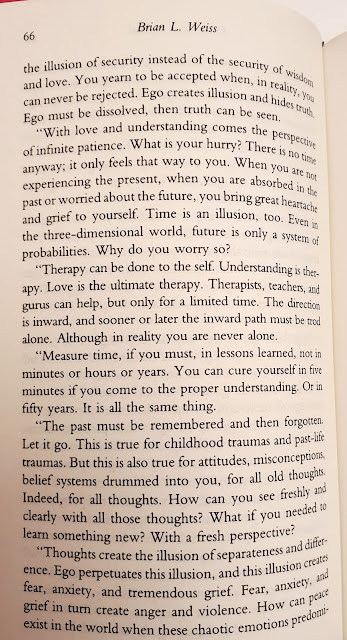From NDERF, Melinda share, " Although time did not exist, this life review took forever but in reality it was only a blink of a second. "
Miguel wrote in NDERF," How long did the experience last? There was no time, so talking about duration is meaningless. It could have been there forever, I guess. I might never have returned, but eventually, I came back.
There are many more people talking about no time from NDERF under Exceptional Experiences here.
Recently, I finally have a better understanding of no time from The Heart Sutra Lecture 5 by Venerable Guan Cheng as shown in the video below. Do watch the video below. The following are from this Lecture 5 Heart Sutra video that I find helpful to me in understanding the Heart Sutra better. Initially I thought that I can't blog much since the Heart Sutra only has 260 Chinese characters translated by Master Xuan Zang. But Heart Sutra is really profound and I always have new insights from listening to the dharma by venerable monks.
The five skandhas is a Sanskrit word for body and mind. What are we made up of? We are made up of the body and mind. We are the creation of the five skandhas namely form, sensation, perception, mental formation and consciousness. We are created by causality by all these five skandhas.
The Buddha wants us to get into more details by giving us more details in the 18 realms which include the six organs, six objects and six consciousnesses.
We have three kinds of sensations- pleasant, unpleasant and neutral.
When we perceive through our senses, some scientists call it empirical evidences. When we use our senses, we attach to what we can torch, ear, see, taste, smell... So empirical evidences sometimes could be illusory. Everybody could be different in empirical senses.
It is different from experiential thinking. Experiential thinking has to be introspective getting inside your mind to see it.
Empirical thinking is bounded by the four dimensions which are the space and time. Space has length, breadth and width. You perceive space and time with senses.
Time contains the past, the present and the future. Time is the product of empirical thinking. If you think about it, does the past exist now? The past does not exist. Time only lives in memory. If you don't have memory, you don't have the past. You forgot about the past. If you don't have memory, do you have the past?
How about the future? People say we have a future But the future hasn't come yet. How can you say the future exists. The future certainly doesn't exist now.
If you want to know more, do watch the following video.


No comments:
Post a Comment